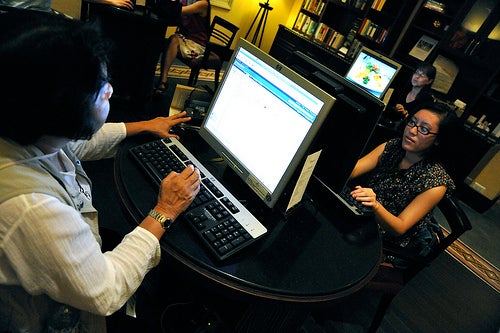 Every country in the world has probably benefited in some way from the unprecedented access to knowledge and services brought about by the digital revolution. But producing knowledge banks and services has so far been a predominately rich-country business. The world’s poorest countries have generally not been able to participate in the production side of the digital economy and share in its rewards. This is changing, however, and an infoDev-led online challenge called m2Work is helping to drive the change. Job creation continues to be a priority of the World Bank and the m2Work competition shows an innovative approach to addressing this challenge.
Every country in the world has probably benefited in some way from the unprecedented access to knowledge and services brought about by the digital revolution. But producing knowledge banks and services has so far been a predominately rich-country business. The world’s poorest countries have generally not been able to participate in the production side of the digital economy and share in its rewards. This is changing, however, and an infoDev-led online challenge called m2Work is helping to drive the change. Job creation continues to be a priority of the World Bank and the m2Work competition shows an innovative approach to addressing this challenge.
As the digital economy grows, it increasingly gives rise to work that is “born digital” – that is, new work that arises out of the possibilities and needs of the digital world. This phenomenon is distinct from how conventional jobs are increasingly digitized in the sense that they make heavy use of information and communication technologies. Most born-digital work represents new work that doesn’t directly compete with old occupations.
For example, hundreds of thousands of people around the world earn income from tasks like moderating images posted by users to an online community, categorizing products on an e-commerce site, and transcribing digital video clips to make them more searchable. Because these tasks are completely digital, they can be physically carried out anywhere a computer can be connected to the Internet.
A recent trend is that demand for such digital blue-collar work is satisfied through so-called “crowdsourcing” and “microsourcing” models. This means that instead of a company hiring a staffer or a contractor to carry out a job, the job is broken down into individual tasks and distributed to a large pool of workers over a digital network.
For example, many companies post their tasks on Amazon Mechanical Turk (AMT), a digital labor marketplace. At any given time, AMT carries around 200,000 micro-tasks, each worth anywhere from a few cents to several dollars. Anyone wishing to earn this money can simply point their web browser to AMT and follow the instructions. Microwork is inclusive in the sense that gender, disability and other personal characteristics do not play a role in digital labor marketplaces.
A 2011 report commissioned by infoDev (a partnership program within the World Bank’s Finance and Private Sector Development Network), titled Knowledge Map of the Virtual Economy, assessed the development potential of digital microwork. According to the report, microwork has several features that make it particularly accessible to people in developing countries. Most tasks require few skills or qualifications, as they rely on the fact that humans are inherently better than computers in tasks like image recognition and natural language processing. Microwork is not connected to one particular spot; a web browser is enough. Low labor cost moreover gives a competitive advantage to workers from developing countries.
Many microworkers are indeed located in the developing world. According to one survey, 34 percent of workers on AMT are from India. Two other microwork distributors, Samasource and MobileWorks, have workers in countries such as Kenya, Pakistan and the Philippines. Workers access the tasks from computers in Internet cafés and offices, and earn income in the form of cash, bank deposits and gift cards. In these low- to medium-developed countries, digital microwork seems to be having a real economic impact.
Low-income countries have the most to gain from tapping into this source of digital export income. However, their ability to do so is limited by their digital infrastructure: the availability of computers and Internet cafés from which to access digital labor markets.
Meanwhile, even the most underprivileged people in the world increasingly have access to mobile phones. There are close to 6 billion mobile phone subscriptions in the world, and over half a billion in India alone. In 2011, mobile phone penetration reached almost 80 percent in the developing world.
To help tap into that high level of mobile access, infoDev and Nokia’s IdeasProject have organized the m2Work online challenge, with funding and support from UKaid and the government of Finland. The challenge aims to identify problems and needs that could be addressed by microworkers who use mobile phones – enabling the bottom billions of the economic pyramid to access the digital economy, and enabling the rest of the world to benefit from their intelligence.
A high-level jury consisting of among others the World Bank’s Chief Information Officer, Ms. Shelley Leibowitz, representatives of Nokia and the wider technology sector, will review the submissions. The best ideas will be awarded with individual cash prizes of up to $20,000. Furthermore, infoDev will use its vast network of Mobile Applications Labs (mLabs) and business incubators to help the winning entrepreneurs every step of the way, guiding it from seed-stage idea to a thriving start-up that creates sustainable jobs.
From earlier experiences in other industries, we know that new blue-collar jobs do not necessarily translate into lasting economic and social development, if the jobs build no long-term capacities. But the Virtual Economy report shows that digital labor can be capacity-building, by showcasing earlier examples of born-digital work. In the end, the m2Work challenge wants to spark a goal-oriented, global discussion about sustainable mobile microwork under the motto of “From millions of tasks to thousands of jobs”.

Join the Conversation